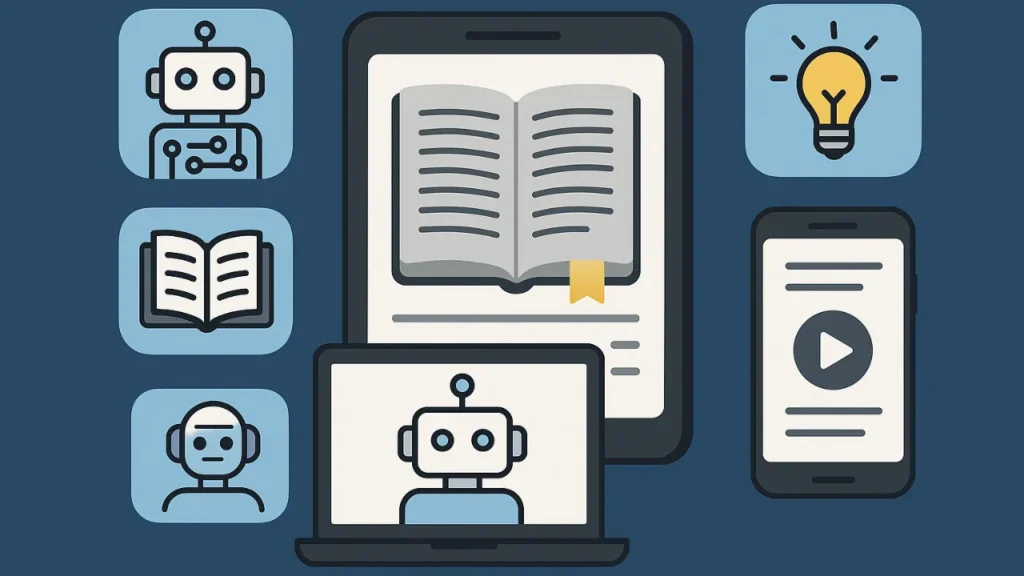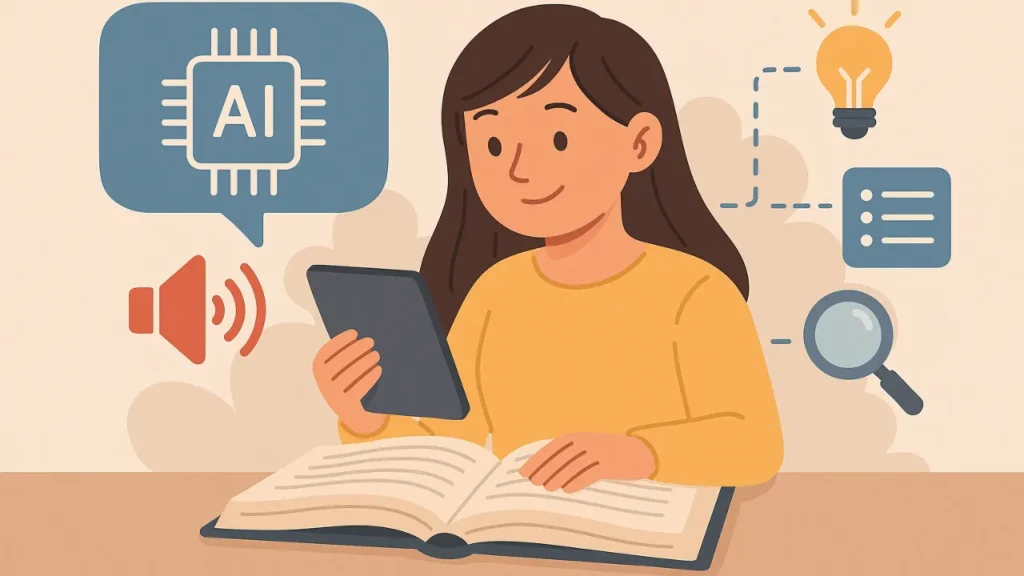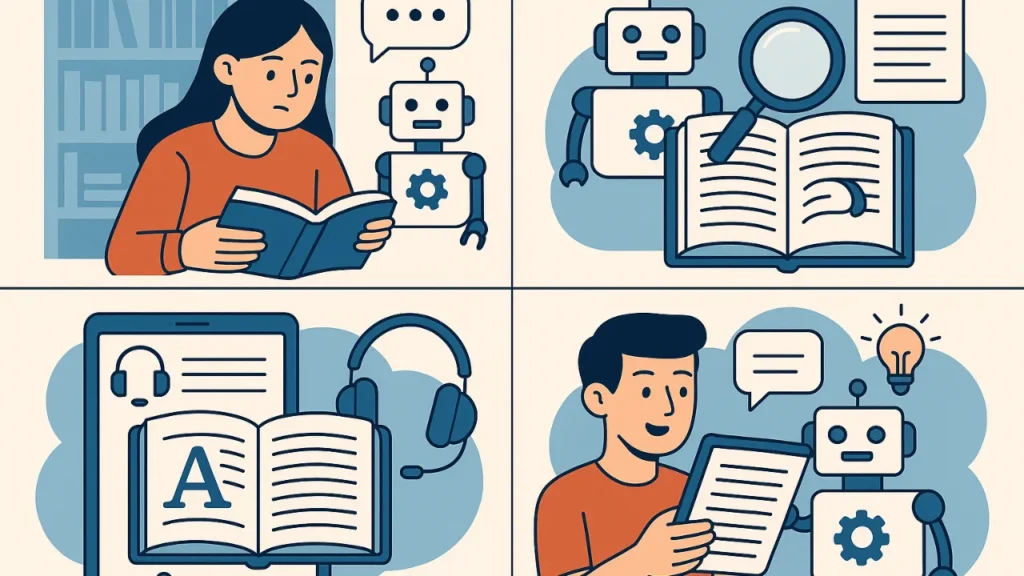Our reading habits are changing, faster than we ever imagined with the help of powerful AI technologies. AI tools for reading books assist students, business people and day-to-day readers to learn faster and smarter. These tools offer much more than just a selection of e-books or audiobooks.
They can summarize chapters, explain challenging concepts, transform text into natural-sounding audio and create notes, translate content and even personalize your reading experience in pursuit of specific goals.
To avoid AI detection, use Undetectable AI. It can do it in a single click.
Table of Contents
Top AI Tools for Reading Books (2025)

These are the top AI tools for reading books that are changing how we read, comprehend and interact with books in 2025:
UPDF AI Assistant
A built-in AI assistant designed to help you interact with PDFs is UPDF AI Assistant.
Key features:
- Summarizes full-length PDF books.
- Let’s users “chat” to the PDF: ask questions, describe subjects in their own words, or pull out key ideas.
- Support annotation, search and bookmarks for better navigation in Document.
Who it’s for: Students, researchers and anyone working with long PDF texts.
Pros / Benefits: Aids retention of key concepts in long reads; this speeds up reading with the conversational interface.
Drawbacks: Primarily geared for PDFs; full power requires a paid version for extensive use.
Myreader.AI
Myreader.AI is an online conversational AI platform for consuming digital books (PDFs, ePubs).
Key features:
- Text-to-speech ability so you can listen to books.
- OCR for scanned books (in pro version).
- Gives exact references / citations when answering your questions.
Best for: Those who like to mix reading and listening, and appreciate citation-backed engagement.
Pros: Adapt to any format easily. Good for deep understanding. It is cloud-based. You get to access your uploads promptly.
Cons: File size restrictions; some high-end features tucked behind paywalls.
BeFreed
BeFreed is a next-gen AI learning platform that converts book summaries into podcast-style audio, flashcards, and personalized learning journeys.
Key features:
- Read summaries in 10, 20 or 40 minute formats to fit available time and energy.
- Customized “AI host” voices and tone that makes learning reminiscent of a personalized podcast.
- Flashcards for retention and comprehension.
Best for: Lifelong learners, professionals and students looking for a more engaging and customizable way to absorb the content of books.
Pros: Great personalization features, habit building and a very human touch.
Cons: Too much if you’re only looking for basic summaries; premium plan needed for full features.
LibraLM
LibraLM is an AI summarizer that combines book summary generation with interactive quizzes and chat.
Key features:
- Smart summaries that summarize non-fiction main ideas.
- Interactive Q&A and chat with the AI to explore more.
- Retention quizzes: Unpack what you learned from summaries.
Best for: Students or readers who want to test their memory and understanding.
Pros: It combines learning and assessment; it’s more entertaining than straight summaries.
Cons: Some structured learning could feel constraining for the not-so-enthusiastic reader.
BooSum
BooSum is a tool that allows you to upload books and then chat with them through AI.
Key features:
- Discussion interface to ask the book questions, understand concepts or discuss themes.
- It supports using 8+ languages, which would be helpful for multilingual readers.
- Create custom insights from your home library.
Best for: Readers who want to explore books further or interactively engage with their uploaded book content.
Pros: Highly customized, multilingual, extremely flexible.
Cons: Users have to upload their books; pro features probably fall within paid tiers.
Google NotebookLM
Google’s research-assistant tool that can analyze your own books, notes, documents and the like.
Key features:
- Summarize uploaded documents (PDF, Google Doc, slides).
- Audio overviews: Turn summaries into podcast-like discussion.
- Interactive Q&A: ask specific questions about your content and get structured answers.
Best for: Researchers, students or professionals who wish to read and write in-depth.
Pros: Strong, it integrates nicely with the Google Ecosystem and accommodates lengthy texts very neatly.
Cons: Need to upload the document; may require Google One/ paid version for more complex limits.
InsightGUIDE
InsightGUIDE is an AI assistant created especially for scientific literature and research papers, great for academic reading.
Key features:
- Step-by-step expert guidance. Focus on key elements such as methodology, results and discussion.
- Opinionated summaries that don’t just summarize but also analyze critically.
- Allows you to “map” the paper, so to speak, to make sense of it logically rather than reading.
Good for: Researchers, PhD students, academics who like a smarter buddy when they’re reading scientific papers.
Pros: Gives necessary structure to reading, time saved, better understanding of complex research.
Cons: Less applicable to general fiction or non-academic books.
NexusSum (Emerging)
NexusSum is a research framework (not a consumer app yet) for natural language summarization of long-form narrative texts such as novels or story-based books using hierarchical LLM agents.
Key features:
- Leverages multi-agent architecture to structure long narratives into concise summaries.
- Dialogue-to-description conversion to preserve the consistency of character arcs, dialogue and scenes.
Best for: Developers, researchers, or advanced reading platforms interested in incorporating narrative-aware summarization.
Pros: A lot of structure to it, keeps the story flowing well, good for very long pieces.
Cons: Not a consumer tool for the mainstream yet; still more of a research innovation.
Choosing the right tool:
- If you tend to read PDF books, then try UPDF AI.
- If you prefer a more “conversational” reading experience, give BooSum or LibraLM a go.
- If you like listening, Myreader.AI or BeFreed are excellent.
- This is the best of the 3 options for academic or research reading, NotebookLM and InsightGUIDE are ideal.
- NexusSum is very promising (though still in research) for future-oriented narrative summarization.
Benefits of Using AI Tools for Reading Books

AI has changed the way we read, study and define books. Here’s a few of those benefits to using AI to read books:
- AI can distill entire books or chapters in seconds. That makes it possible for busy readers to get a sense of the big idea without spending hours poring over every page. It is particularly great for research, academic study and non-fiction books.
- AI techs can clarify tough concepts, summarize complex chapters and even distill rough passages into easier-to-read versions. Readers are able to gain further insight into the content by posing questions directly to the AI.
- Text-to-speech by AI provides a natural audio representation of books. It allows you to listen on your commute, while exercising, while cooking or lying down making it easier to consume more books.
- AI book readers can generate notes, highlight important points, extract key themes, and create flashcards for revision. It makes learning more systemized and effective.
- Business, law, medicine or tech professionals can use AI tools to read lengthy reports faster and analyze research papers or industry books for some truly cutting-edge insights. AI can also sift through information for comparisons, insights and active patterns.
- Some AI tools “learn” your preferences such as the topics that interest you, your preferred difficulty level, reading speed and so on and then recommend content tailored to you. This provides and encourages regular reading habits, which in turn enhance learning.
- AI readers assist readers with visual disabilities (via reading the description), dyslexic individuals (through simplified text), and people with learning difficulties. This is inclusive of, and empowering to, readers.
- AI can real time translate books into multiple languages. That’s a boon for students learning a new language or readers buying books not in their mother tongue.
- Features such as quizzes, interactive chats and chapter overviews help readers retain more. This makes reading a process of active learning rather than passive jettisoning.
Use Cases of AI Tools for Reading Books

AI reading tools have value in numerous areas. For students, professionals or just casual book lovers, here are some tools to make reading faster and how to use them.
Here are some of the most popular and impactful use cases:
Students and Academic Learners
AI can allow students to more quickly understand texts in textbooks, research papers and study materials.
They can:
- Summarize long chapters
- Explain difficult concepts
- Generate notes and flashcards
- Provide Q&A-style assistance
This may help them to save time and perform better in the school.
Professionals Who Are Too Swamped to Study at a Slow Pace
Businesspeople, techies, lawyers, doctors and bankers read long documents all the time.
AI tools help by:
- Highlighting important information
- Creating quick summaries
- Analyzing reports or industry books
That can help professionals stay informed without needing to spend hours reading.
Researchers and Scholars
Researchers read a host of complex articles and long academic papers.
AI tools help them:
- Break down methodologies
- Identify key findings
- Compare multiple sources
- Maintain structured notes
This facilitates understanding and accelerates the research.
Casual Readers Who Want Convenience
For those who just love to read, AI tools provide:
- Audiobook-style listening
- Personalized recommendations
- Chapter highlights
- Easy-to-understand explanations
That is what makes reading easy and fun!
For People With Visual or Learning Disabilities
The built-in AI text-to-speech and simplified text features support:
- Visually impaired individuals
- People with dyslexia
- Readers with attention disorders
AI makes books accessible to anyone without limitations.
Language Learners and Multilingual Readers
AI tools can translate books, define vocabulary and provide quick English-language versions of complex texts.
This is helpful for:
- Students learning a new language
- Readers reading books not written in their mother tongue
- Travelers or global readers with an interest in international literature
Content Creators and Writers
Here is what bloggers, writers and creators are doing with AI reading:
- Extract key ideas from books
- Analyze writing style
- Generate content outlines
- Save research time
This enhances creativity and accelerates content creation.
Audio Books Enthusiasts and Busy People!
Most of these AI book readers turn text into fairly natural-sounding audio.
This makes it possible for users to “read” books while:
- Driving
- Exercising
- Cooking
- Working
It can turn downtime into learning time.
FAQs: AI Tools for Reading Books
What is an AI tool for reading books?
An AI book reader is a type of digital assistant that can help readers quickly get the gist of what a book is about, read, translate, and analyze them. It enables users to learn books faster and more effectively through text-to-speech, AI chat and smart summaries.
How can an AI summarize a whole book?
Yes, many of today’s AI tools can summarize complete books or chapters pretty well. But quality can vary depending on the tool, complexity of book, and how well content is uploaded or formatted.
Can AI-powered book-reading tools help students?
Absolutely! AI tools assist students by summarizing chapters, creating notes, explaining tough concepts and providing Q&A-style support. They save time and increase comprehension, especially with lengthy textbooks or academic material.
Conclusion: AI Tools for Reading Books
AI tools for reading books are changing the way we learn, study and absorb information. From chapter summaries to read-aloud and translated text functions, creating study notes and answering your questions: these tools help you read faster, more comprehensibly than ever.
As the technological progress continues, AI book readers will grow even more powerful. Whether you are short on time, or need a better understanding of the complete context before presenting a work, reading books with AI is one smart and effective way to learn.
Read Also:
How to Create an AI Marketing Strategy?


